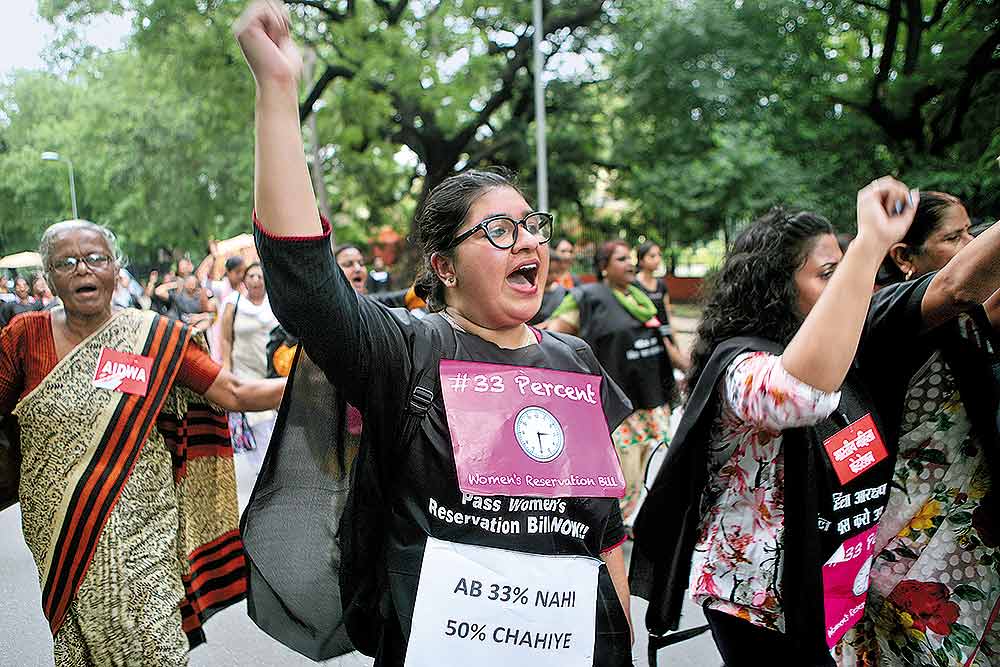Madhumati Agrawal
If politics is about decision making, then affirmative action in politics is about equitable representation of the diverse population. The foundations of a democratic society dictate that the voices of the oppressed must be taken into account so as to prevent majoritarian rule. Thus, it becomes an imminent necessity that the female gender, which has been subject to the pitiable predicament of oppression, violence, historical erasure, bounded restrictions and cultural subjugation within and outside the family as well as society, gets its much-coveted voice in the sanctum of politics. In the micro-political level, in the parental household, the politics of precedence of male child over female is a malice in society aiding further in the minimal representation of women in political arenas.
Historically, gender has always been at the forefront of power politics and dynamics. The female body has served as a battleground for multiple political discourses. May it be regarding abortion laws, voting rights, sexual and reproductive rights, anti-sexual harassment policies and other such policies for the overall cultural, social and economic development of women but at the core of all these discourses, representation is of key importance. For a significantly large duration of time, men have been responsible for legislating, drafting and debating policies directed towards the female populace, with negligible or null contributions taken from women policymakers. The constitutional ideals of this nation by virtue of its fundamental rights and by virtue of India’s obligation owed to multiple international conventions like United Nations Convention on the Elimination of All Forms of Discrimination against Women, Universal Declaration of Human Rights, The Beijing Declaration, the Platform for Action and many more, make it a mandate for the nation’s policymakers, to ensure affirmative action in all socio-economic and cultural arenas directed towards women. At the core of this affirmative action lies politics and political participation of women. These policies will only be drafted and implemented effectively and meticulously when women voices are heard and taken into consideration, while they have a significant involvement at all levels of administration.
When we talk about ensuring political participation of women, we must take into account that this representation has to be sought from the political grassroots to the upper corners of parliamentary bodies so as to ensure that the representation is equitably distributed in all societal strata of decision-making forums. At the outset, we must also note that the discourse of participation of women in politics cannot be complete without addressing the fact that when we talk about women, we must not forget to formulate significant policies for participation of trans-women in these political decision-making processes. They have been robbed of the opportunity of being represented for much longer than cisgender women have been. Up until the NALSA v. Union of India judgement, their recognition as a gender group was also missing.
According to the World Economic Forum’s Global Gender Gap Report 2020, India ranks 18th in terms of political empowerment, significantly ahead of its other rankings. The political empowerment ranking is higher than that of the UK, which is ranked 20th, and substantially higher than that of the US, which is ranked 68th. Even if it looks like an achievement on the surface, if we dig deeper, we find out that the ranking takes into account the number of female heads of state in the past 50 years, which gives India an advantage due to Indira Gandhi’s tenure as PM for two terms. Even though her leadership paved multiple forefronts for inclusion of women in politics, this statistic messes up the index’s interpretation of political participation of women in India. It fails to take into consideration representation of women at multiple levels of politics and most importantly as state political heads. The Rajya Sabha enacted the Women’s Reservation Bill in 2010, which aims to modify the Constitution to reserve a third of all seats in Lok Sabha and all state legislative assemblies for women.
However, the Bill has yet to be placed to a vote in Lok Sabha, preventing it from becoming law. The measure has resurfaced in recent public debate, highlighting the need for more women representation in government at all branches of administration. Chief Minister Naveen Patnaik has been an ardent promoter of feminist ideals and puts strong worded contentions in favour of political participation of women. He in 2019 announced 33% reservation for women in ticket allocations for general elections. His party gave 7 out of 21 MP tickets to women in 2019 general elections.
Even though the path of complete realisation of this political goal throughout the nation is long and tedious, one can take active measures in voicing the cause of women and ensuring affirmative action in fields of education, healthcare, family welfare and economics.
The writer is an advocate in the Orissa High Court.
